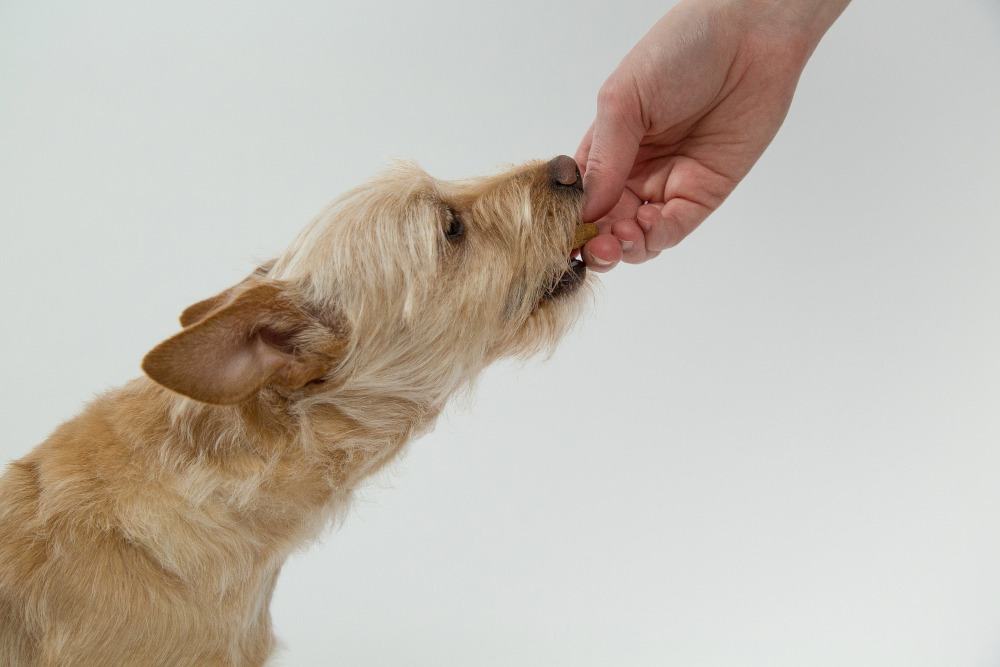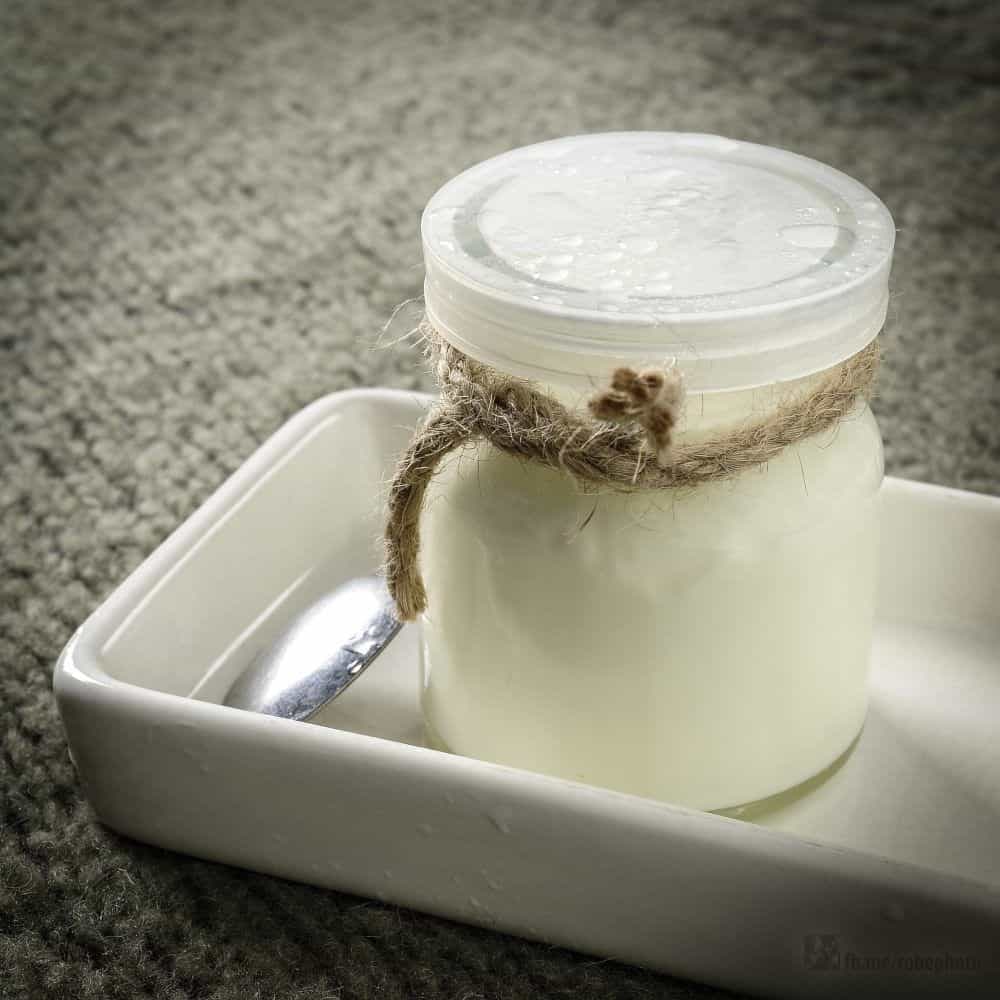Dogs are man’s best friends. This means that we want the best for our pet when it comes to anything related to their health, whether it is dog supplements, dental care, puppy massages, or the right kind of food.
The general consensus is that dog food and food meant for human consumption should not be interchanged, as much of your food can be toxic for your furry friend. However, there are some exceptions to this rule, for example, yogurt.

Now that you know that you can feed your dog yogurt, you may have a number of other questions. What kind of yogurt can be fed to dogs? How much yogurt is enough? What are the benefits? Can yogurt upset your dog’s stomach? There is no reason for you to worry.
Keep reading to know all you need about feeding your dog yogurt and all the great benefits from eating it, like boosting digestive health, bone and muscle health and clearing up yeast infections on the skin.
Table of Contents
How Much Yogurt Can Dogs Eat?
There is no exact amount that can be prescribed to any dog as the right serving size depends from dog to dog on the basis of what kind of yogurt you are feeding it and its own physical characteristics. The variables include your dog’s size, weight, daily calorie intake, the presence of any underlying health issues, its activity level and neuter status.

It is important that you figure out your dog’s daily nutritional needs, as that can help you in determining how much yogurt your pet can have. According to veterinarians, the yogurt intake should be based on the ten percent treat rule. This means that the amount of yogurt you feed your dog should be no more than ten percent of the total calories that your dog eats each day.
What Kind of Yogurt Can Be Fed to Dogs?
First and foremost, it is important to define what is yogurt and what doesn’t qualify as yogurt. The yogurt that you feed your dog must be plain, have no added sugar and should be loaded up with probiotics that are great for the health of humans and dogs alike.

Keep in mind that not every type of yogurt available in the market has probiotics or health benefits. A helpful tip here is to read labels if you aren’t sure about a product’s ingredients. Anything that mentions terms like yogurt “coated” or “flavored” isn’t really actual yogurt and will not carry the benefits of healthy yogurt. In order to ensure that your dog is getting all the nutrients from yogurt, it must be regular yogurt.
If you have doubts about any of the options available in the market, you can make your own yogurt at home.
Healthy Yogurt for Dogs
Plain Yogurt
Unless your dog is lactose intolerant – in which case you shouldn’t be feeding it any type of yogurt – regular plain yogurt is safe for consumption. This type contains probiotics, which are live cultures of bacteria that work wonders for the health of your dog’s gut. These probiotics are especially helpful if your dog is taking any antibiotics, as harsh medication can kill off some of the good bacteria in your dog’s stomach.
Yogurt also contains calcium and protein, which is great for bone and muscle health, and potassium, that allows dogs to absorb fluids and maintain their cardiac and nervous systems.

If you are confused about how you can feed your dog yogurt, just a few licks here and there should be enough. Another option is adding a small serving of plain yogurt on top of the dog’s food. In case your dog is on antibiotics, you can feed it a couple of spoons of plain yogurt some hours after it takes the medicine.
To make sure that your feeding your dog the healthiest yogurt possible we'd recommend learning how to make yogurt at home.. If you're in the market for a yogurt maker see our buying guide.
Greek Yogurt
Greek yogurt is safe for dogs unless your dog is lactose intolerant. It can be healthier than a lot of other yogurt options as it contains more concentrated levels of probiotics. This also makes it particularly helpful for dogs taking antibiotics, as discussed before. If you'd like to make your own Greek yogurt at home see our Greek yogurt maker reviews.

Kefir
Even if your dog is lactose intolerant, you can find alternatives to feed your pet. A great alternative is kefir as there are versions that don’t have milk. Kefir variants can be made up of water, coconut milk or almond milk - all of which are all lactose-free. Just like the other two healthy yogurt options, kefir is packed with probiotics that help maintain a healthy gut and promote the health of dogs taking antibiotics.
Kefir is also loaded with a ton of other nutrients like vitamins, biotin, calcium, and phosphorus, amongst many others. Kefir has multiple benefits for dogs and can help them in fighting allergies and improve their overall health.

Yogurts to Avoid
Vanilla Yogurt
While a small amount of vanilla yogurt shouldn’t be too bad for your dog, it is better to stick to plain or Greek yogurt. The main reason behind this is that vanilla yogurt has higher sugar content than the regular yogurt varieties, which cuts down on its benefits. There are some brands that add artificial sweeteners to their yogurt, which can be extremely dangerous for your dog. Xylitol, in particular, is extremely toxic to dogs.
Flavored Yogurt
Flavored yogurt is usually laden with a ton of sugar, which makes it an unhealthy option for your pet. While plain or regular yogurt is safe for your dog’s consumption, flavored yogurt is usually full of artificial sweeteners. One of these artificial sweeteners is Xylitol, which is extremely toxic to dogs.

Light or Diet Yogurt
The dog’s body functions in a manner that is different from the human body. Keeping this in mind, it is important that you do not feed your pet anything that may disturb the body’s regular functioning. Avoid any light or diet varieties of yogurts as they may have artificial products and sweeteners that can be bad for your dog’s health.
Store bought frozen yogurt is also usually high in sugar and calories and should also be avoided. Unless you make your own frozen yogurt at home and use healthy ingredients.
What Are the Benefits of Yogurt?
Yogurt is a great source of nutrients like calcium, probiotics, and zinc. This means it will be helpful in dealing with a number of gastrointestinal problems that your dog may suffer from. These problems range from diarrhea, infections and inflamed bowels, to the overgrowth of bacteria or absorption issues.

As yogurt is not expensive and can be found at any supermarket across the country, it is a good addition to any diet. The yogurt is also a great source of protein and also helps in creating a feeling of being full for longer when fed to your dog. This has the ability to aid weight loss if your dog is suffering from any weight-related issues.
What Are Other Good Sources of Probiotics?
Plain yogurt has a good amount of probiotics that will help your dog with digestion-related issues. Probiotics help in getting rid of the bad bacteria in the pet’s stomach and replace it with the good type of bacteria. This can be helpful if you have a dog who loves to go and eat anything and everything that it finds lying around.
Yogurt, however, isn’t the only source of probiotics. There are a number of treats available in the market that already have a lot of probiotics added to them. It is important, however, that you check the labels carefully before you buy these as you don’t want to take any chances with your furry pet’s life.

If you are ever in doubt over what suits your dog and what doesn’t, it is important that you visit a veterinarian without any delay. There may be a number of options that your vet may recommend that may work out better for your dog than the ones you have been employing.
In all, yogurt is an easy addition to your dog’s diet and can work well for regular use. You may face some resistance from your pet when you try to feed them yogurt so it is recommended that you start off by mixing a couple of spoons of yogurt into your pet’s food every day!
